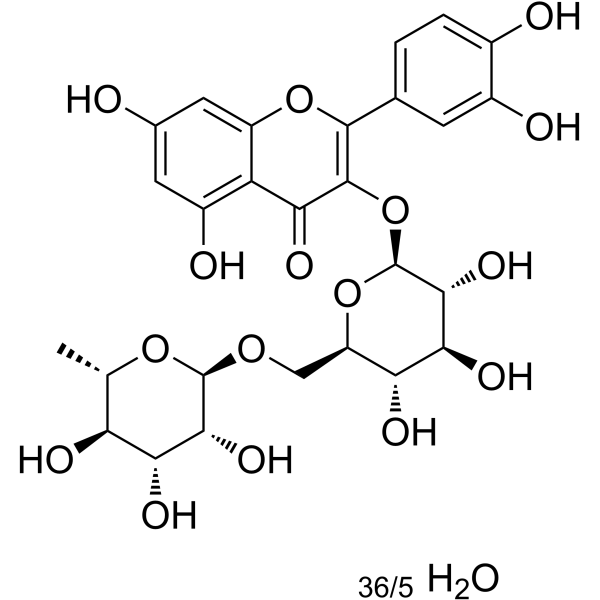
Rutin hydrate
CAS No. 207671-50-9
Rutin hydrate( Quercetin-3-O-rutinoside | Rutoside | Sophorin )
Catalog No. M27574 CAS No. 207671-50-9
Rutin hydrate, a kind of glycoside, widely exists in many plants including citrus fruit.
Purity : >98% (HPLC)
 COA
COA
 Datasheet
Datasheet
 HNMR
HNMR
 HPLC
HPLC
 MSDS
MSDS
 Handing Instructions
Handing Instructions
| Size | Price / USD | Stock | Quantity |
| 100MG | Get Quote | In Stock |


|
| 200MG | Get Quote | In Stock |


|
| 500MG | Get Quote | In Stock |


|
| 1G | Get Quote | In Stock |


|
Biological Information
-
Product NameRutin hydrate
-
NoteResearch use only, not for human use.
-
Brief DescriptionRutin hydrate, a kind of glycoside, widely exists in many plants including citrus fruit.
-
DescriptionRutin hydrate, a kind of glycoside, widely exists in many plants including citrus fruit.
-
In Vitro——
-
In VivoRutin hydrate ameliorates cadmium chloride-induced spatial memory loss and neural apoptosis in rats by enhancing levels of acetylcholine, inhibiting JNK and ERK1/2 activation and activating mTOR signaling.
-
SynonymsQuercetin-3-O-rutinoside | Rutoside | Sophorin
-
PathwayMembrane Transporter/Ion Channel
-
TargetBeta Amyloid
-
Recptor——
-
Research Area——
-
Indication——
Chemical Information
-
CAS Number207671-50-9
-
Formula Weight610.52
-
Molecular FormulaC27H30O16.xH2O
-
Purity>98% (HPLC)
-
SolubilityIn Vitro:?DMSO : 50 mg/mL (67.54 mM)
-
SMILESCC1OC(OCC2OC(OC3=C(OC4=C(C(=CC(=C4)O)O)C3=O)C5=CC(=C(O)C=C5)O)C(O)C(O)C2O)C(O)C(O)C1O
-
Chemical Name——
Shipping & Storage Information
-
Storage(-20℃)
-
ShippingWith Ice Pack
-
Stability≥ 2 years
Reference
1.David M Suckling, et al. Development of single-dispenser pheromone suppression of Epiphyas postvittana, Planotortrix octo and Ctenopseustis obliquana in New Zealand stone fruit orchards. Pest Manag Sci. 2012 Jun;68(6):928-34.
molnova catalog



related products
-
Chemerin-9 (149-157)
The nonapeptide 149,YFPGQFAFS157 (chemerin-9), corresponding to the C terminus of processed chemerin, retained most of the activity of the full-size protein, with regard to agonism toward the chemerinR.the natural ligand of ChemR23 (chemerinR).
-
Amyloid β Peptide (4...
Amyloid β-Peptide (1-42) human is a 42-amino acid peptide which plays a key role in the pathogenesis of Alzheimer disease.
-
MAO-B-IN-9
MAO-B-IN-9 is a monoamine oxidase B MAO-B inhibitor (IC50: 0.18 μM) that crosses the blood-brain barrier with potency, selectivity and time-dependence.



 Cart
Cart
 sales@molnova.com
sales@molnova.com


